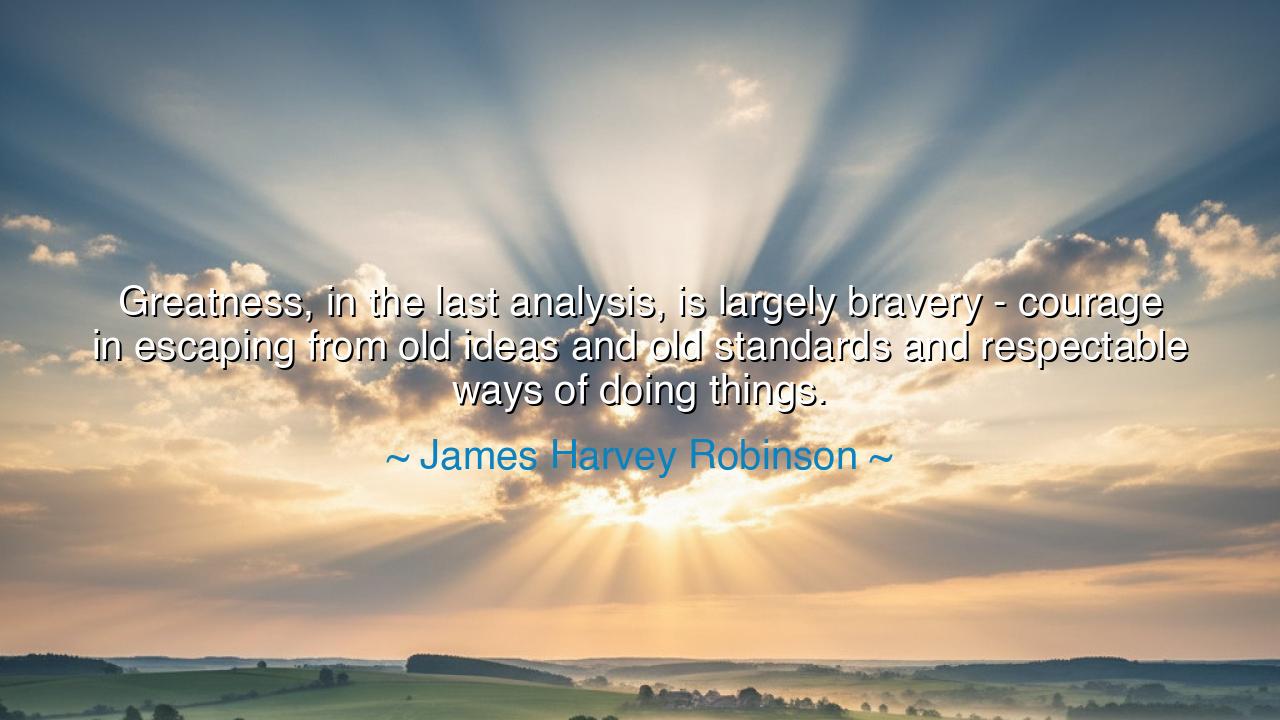
Greatness, in the last analysis, is largely bravery - courage in
Greatness, in the last analysis, is largely bravery - courage in escaping from old ideas and old standards and respectable ways of doing things.






The historian and thinker James Harvey Robinson, in his study of the human mind and its progress through ages, once spoke with quiet thunder: “Greatness, in the last analysis, is largely bravery—courage in escaping from old ideas and old standards and respectable ways of doing things.” His words shine with a wisdom older than time, for they remind us that the true measure of greatness is not in wealth, nor rank, nor inheritance, but in the strength to rise beyond the prison of custom. The mind that dares to think differently, the soul that refuses to be bound by tradition merely because it is ancient, these are the forces that move the world forward.
From the dawn of civilization, men and women have bowed before the altar of respectability, fearing to depart from what is known. Yet every step of human advancement—every new truth, every higher form of beauty, every victory of justice—has been won by those who dared to challenge what others held sacred. It takes bravery to leave the shelter of accepted thought, for beyond it lies uncertainty, criticism, and often loneliness. But as Robinson teaches, it is precisely in this escape from old ideas that the seeds of greatness are sown. The timid mind clings to comfort; the brave one ventures into chaos and brings back wisdom.
The origin of this truth is as ancient as the fire Prometheus stole from the gods. Every act of creation begins as an act of rebellion against the old order. The prophets who spoke truth to kings, the philosophers who questioned the heavens, the inventors who defied superstition—all paid dearly for their courage. Yet through their defiance, humanity rose. When Galileo lifted his telescope and saw the Earth not as the center of creation but as one among many worlds, he faced condemnation, but his bravery shattered centuries of ignorance. So too did the great reformers of every age—Luther against the corruption of faith, Darwin against the comfort of dogma, and Rosa Parks against the weight of oppression—each breaking the invisible chains of “respectable ways of doing things.”
It is a strange and paradoxical truth: the world honors its rebels only after it has broken them. The same voices that cry “heretic,” “madman,” and “traitor” in one century will cry “hero,” “genius,” and “visionary” in the next. This is because old standards do not yield easily. They have the strength of habit and the authority of age. To oppose them is to stand alone in the storm. Yet greatness demands this isolation, for it is only in solitude that the soul hears its higher calling. Robinson’s words remind us that the path of progress is never trodden by the fearful. It belongs to those whose courage outweighs their desire for approval.
Think, for a moment, of Socrates, who drank the hemlock rather than betray his conscience. He refused to bow to the “respectable ways” of Athens, choosing death over the denial of truth. His bravery birthed a lineage of thinkers who would shape the moral and intellectual foundations of the world. Or consider Marie Curie, who pursued her study of radiation despite illness, prejudice, and poverty. She dared to question established science and, in doing so, transformed it. Her greatness was not in her discoveries alone, but in her unrelenting courage to think beyond the limits set before her. These are the spirits who embody Robinson’s vision—the pioneers whose light guides generations beyond them.
Yet the teaching of this quote is not reserved for the heroes of history; it belongs to each of us. For every soul must, in its own way, escape from the old ideas that imprison it. The chains may be invisible—fear of failure, the opinions of others, the comfort of routine—but they are no less binding. To live greatly is to confront them, to question even what we have inherited from our own past selves. Courage is not always found on battlefields; often, it is found in the quiet decision to live authentically, to say, “This path is mine,” even when it defies expectation.
Therefore, let this wisdom be carried into the hearts of all who seek to rise: Greatness is not born in conformity but in bravery—in the willingness to unlearn, to question, and to begin anew. Do not fear to challenge the old, for the old was once new, and the new will one day guide others. Cultivate your mind not as a shrine to tradition, but as a forge of truth. Stand apart when conscience demands it. Speak when silence is the easier choice. And remember, as Robinson teaches, that it is only through the courage to escape from old ideas that humanity—and your own soul—can truly grow.
For in the end, greatness is not a gift given by fate; it is the reward of those brave enough to see beyond what is, and to shape what might yet be.






AAdministratorAdministrator
Welcome, honored guests. Please leave a comment, we will respond soon